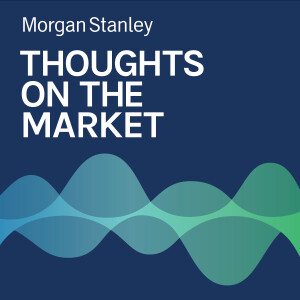
Ed Stanley: The Risky Path to a Multipolar World
 2023-04-28
2023-04-28
With the world moving towards a more complex and decentralized multipolar structure, how will technology and infrastructure markets fare going forward?
----- Transcript -----
Welcome to Thoughts on the Market. I'm Ed Stanley, Morgan Stanley's Head of Thematic Research in Europe. Along with my colleagues bringing you a variety of perspectives, today I'll be talking about the complex issue of security in the multipolar world.
For some time, the world has been trending away from a globalized, unipolar structure characterized by stability and mutual cooperation. And in its place, we've been moving towards a multipolar structure, more complex, more decentralized. And this theme is one that Morgan Stanley's Global Research Department has been exploring deeply over the last three years.
And the time is right to revisit that theme now because it's accelerating. And we see two plausible outcomes from here, a de-risking or a decoupling, lie ahead for companies. Our base case is still for a gradual phased de-risking between regions and companies are already in the process of facing up to that new reality, by diversifying their highly concentrated supply chains. But the possibility of a full and disorderly decoupling scenario now warrants more serious consideration. It's no longer the tail risk it was when we first addressed the theme three years ago.
What has acted as a more recent accelerant to this trend is the extent of top down policy measures we've witnessed over recent years. The number of such policies designed to restrict trade have increased fivefold in the last five years, as measured by the UN. And these restrictions have covered everything from rare earth battery minerals, to grain exports and solar panel imports, to specialist machinery for microchip production.
Add to this the ever greater incentives to reshore supply chains and critical components back to the U.S. and Europe, in the form of the CHIPS Act, the U.S. IRA and Europe's response to it, and it becomes clearer why this multipolar world and de-risking theme continue to gather pace. After all, Europe's market share of critical inputs and technologies stand at about 6% versus China's at over 50%. And that scale of imbalance will take time and substantial resources to even partially reverse.
And while this is a complex theme with many moving parts, there is one relatively simple conclusion. Whether the world continues to gradually de-risk or more abruptly decouple, greater spending on security and critical infrastructure will be essential.
Consequently, the industrial and tech sectors will likely need to allocate the most capital to achieve this de-risking process. But we also see promise for more than 80 companies exposed to the critical infrastructure buildout, which should see higher demand and should be able to generate strong return on capital in the process. These are the types of companies that should be well-placed, as this theme evolves. Our new security framework suggests that space infrastructure, artificial intelligence and batteries may be areas of greatest focus for the markets going forward.
Thanks for listening. If you enjoyed the show, please leave us a review on Apple Podcasts, and share Thoughts on the Market with a friend or a colleague today.
More Episodes
 2024-11-15
2024-11-15
 2024-11-14
2024-11-14
 2024-11-13
2024-11-13
 2024-11-12
2024-11-12
 2024-11-11
2024-11-11
 2024-11-08
2024-11-08
 2024-11-07
2024-11-07
 2024-11-05
2024-11-05
 2024-11-01
2024-11-01
 2024-10-31
2024-10-31
 2024-10-30
2024-10-30
 2024-10-29
2024-10-29
 2024-10-28
2024-10-28
 2024-10-25
2024-10-25
 2024-10-23
2024-10-23
Create your
podcast in
minutes
- Full-featured podcast site
- Unlimited storage and bandwidth
- Comprehensive podcast stats
- Distribute to Apple Podcasts, Spotify, and more
- Make money with your podcast
It is Free
- Privacy Policy
- Cookie Policy
- Terms of Use
- Consent Preferences
- Copyright © 2015-2024 Podbean.com




